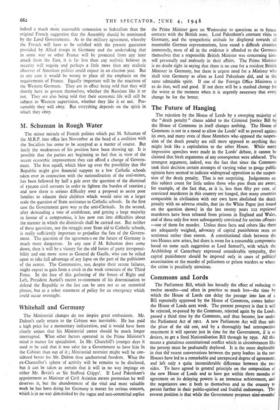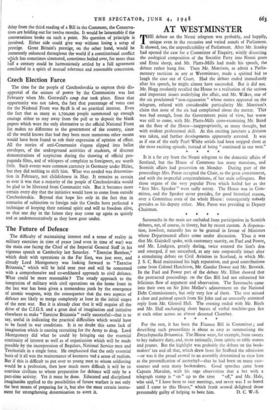Commons and Lords
The Parliament Bill, which has broadly the effect of reducing to twelve months—and often in practice to much less—the time by which the House of Lords can delay the passage into law- of a Bill repeatedly approved by the House of Commons, comes before the House of Lords next week. The present prospect is that it will be rejected, re-passed by the Commons, rejected again by the Lords, passed a third time by the Commons, and thus become_ law under the Parliament Act of 1911. A new Parliament Act will thus take the place of the old one, and by a thoroughly bad retrospective enactment it will operate just in time for the Government, if it so desires, to get a Steel Nationalisation Bill through by 1950. All this means a gratuitous constitutional conflict which in circumstances like the present must be profoundly deplored. It is the more deplorable in that tht recent conversations between the party leaders in the two Houses have led to a remarkable and unexpected degree of agreement, and left only a quite inconsiderable difference between the two sides. To have agreed in general principle on the composition of the new House of Lords and to have got within three months of agreement on its delaying powers is an immense achievement, and the negotiators owe it both to themselves and to the country to persist further in their public-spirited and fruitful endeavours. The Present position is that while the Government proposes nine-months'
delay from the third reading of a Bill in the Commons, the Conserva- tives are holding out for twelve months. It would be lamentable if the conversations broke on such a point. No question of principle is involved. Either side could give way without losing a scrap of prestige. Great Britain's prestige, on the othrr hand, would be immensely enhanced throughout the world if a constitutional conflict which has sometimes simmered, sometimes boiled over, for more than half a century could be harmoniously settled by a full agreement concluded in a spirit of mutual tolerance and reasonable concession.



































 Previous page
Previous page